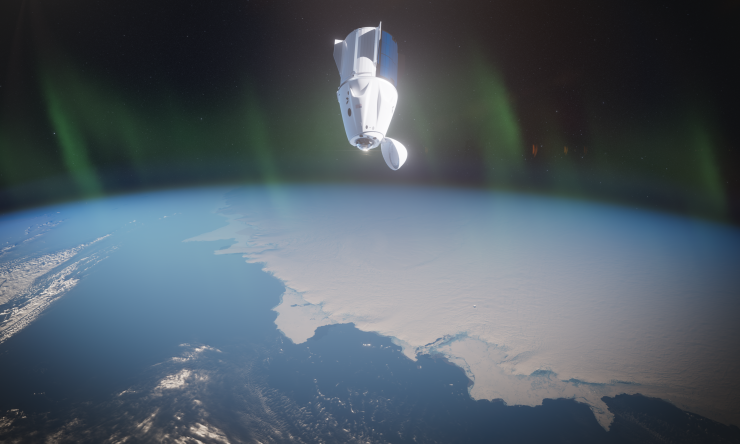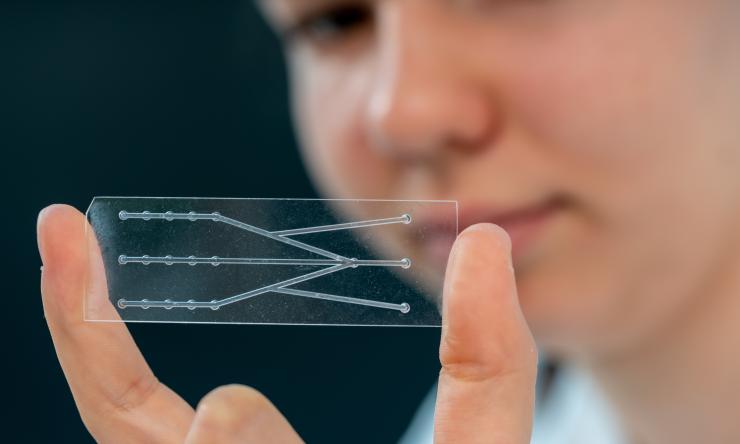Investigation of Blood-based Circulating Biomarkers of Responses to Space Radiation
Principal Investigator: Eloise Pariset, Ph.D.
Institution: NASA Ames Research Center
Project Dates: Nov. 1, 2019 – March 31, 2021
Monitoring Biomarkers for Muscular Atrophy Using Nanoelectronic Chip for Astronaut Health
Principal Investigator: Morgan J. Anderson, Ph.D.
Institution: NASA Ames Research Center
Project Dates: Sept. 1, 2019 – Aug. 31, 2021
Space-Feasible Body Composition and Body Shape Analysis for Long Duration Missions
Principal Investigator: John Shepherd, Ph.D.
Institution: University of Hawaii
Project Dates: Sept. 1, 2019 – Aug. 31, 2021
Scientific Physical and Operations Characterization (SPOC) - Capturing Physical Terrestrial Fieldwork in Context
Principal Investigator: Rachel Vitali, Ph.D.
Institution: University of Michigan
Project Dates: Sept. 1, 2019 – Aug. 31, 2020
Effects of Galactic Cosmic Radiation on Translationally-Relevant Cognitive Behaviors and Response to Social Stress
Principal Investigator: Frederico C. Kiffer, Ph.D.
Institution: Children's Hospital of Philadelphia
Project Dates: Aug. 1, 2019 – July 31, 2022
In Situ Expression Analysis of Therapeutic Microbes with Gastrointestinal Devices
Principal Investigator: Miguel Jimenez, Ph.D.
Institution: Massachusetts Institute of Technology
Project Dates: Aug. 1, 2019 – April 30, 2021
Investigating the Combinatorial Effects of Intraocular Pressure and Hypobaric Hypoxia on Corneal Function
Principal Investigator: Andrew Ford, Ph.D.
Institution: Tufts University
Project Dates: Aug. 1, 2019 – March 31, 2021
Virtual Human Simulation Framework
Principal Investigator: Erik Funkhouser
Institution: Level Ex
Project Dates: Aug. 1, 2019 – July 31, 2020
Retired Astronauts Medical Data Repository (RADAR): a Feasibility Project
Principal Investigator: Bonnie Dunbar, Ph.D.
Institution: Texas Engineering Experiment Station
Project Dates: June 1, 2019 – Oct. 31, 2020
Organs on a Chip Platform for Assessing Cosmic Radiation Damage
Principal Investigator: Gordana Vunjak-Novakovic, Ph.D.
Institution: Columbia University
Project Dates: June 1, 2019 – Sept. 30, 2020
Impact of Radiation Exposure on a 3D In Vitro Model of Human Bone Marrow
Principal Investigator: Steven George, Ph.D.
Institution: University of California, Davis
Project Dates: June 1, 2019 – Aug. 31, 2020
The Ex-Vivo Human Translaminar Autonomous System to Study SANS Pathogenesis
Principal Investigator: Tasneem Sharma, Ph.D.
Institution: Indiana University School of Medicine
Project Dates: June 1, 2019 – Aug. 31, 2020
Establish the Feasibility of Engineering a Human Optic-Nerve-On-A-Chip as an In Vitro Model for SANS Research
Principal Investigator: Anup Dutt Sharma, Ph.D.
Institution: AxoSim, Inc.
Project Dates: June 1, 2019 – May 31, 2020
Non-contact Sleep, Vitals, and Behavior Sensing
Principal Investigator: Dina Katabi, Ph.D.
Institution: Emerald Innovations, Inc.
Project Dates: May 1, 2019 – Sept. 30, 2020
VisualDx Clinical Decision Support for Ultrasound
Principal Investigator: Art Papier, M.D.
Institution: VisualDx
Project Dates: May 1, 2019 – July 31, 2020
Objective Refraction with Self-operable, Lightweight Autorefractor
Principal Investigator: Shivang Dave, Ph.D.
Institution: PlenOptika, Inc.
Project Dates: May 1, 2019 – April 30, 2020
The Cytotracker: Point-of-use Complete Blood Count
Principal Investigator: Mehdi Javanmard, Ph.D.
Institution: Rizlab Health, Inc.
Project Dates: May 1, 2019 – April 30, 2020
EmbraceX
Principal Investigator: Matteo Lai
Institution: Empatica, Inc.
Project Dates: May 1, 2019 – April 30, 2020
Cell-free Production of Pharmaceutical-grade Biologics
Principal Investigator: Felix Moser, Ph.D.
Institution: Synlife
Project Dates: May 1, 2019 – April 30, 2020
Project Atlas
Principal Investigator: Josh Ruben
Institution: Z3VR
Project Dates: May 1, 2019 – April 30, 2020
InnaMed TeleLab Platform
Principal Investigator: Anup Singh
Institution: InnaMed, Inc.
Project Dates: May 1, 2019 – April 30, 2020
Room Temperature Stable Basic Metabolic Panel
Principal Investigator: Elizabeth Palaima, Ph.D.
Institution: Ativa Medical Corporation
Project Dates: May 1, 2019 – March 31, 2020
Intelligent Assistance for Accurate and Reliable Lymphatic Data Collection
Principal Investigator: Matthew Johnson, Ph.D.
Institution: Institute for Human and Machine Cognition
Project Dates: March 1, 2019 – March 31, 2020
Human-centered Design Augmentation of the Vertical Flow Paper-based Health Monitoring Platform Principal Investigator: Jian Gu, Ph.D.
Institution: University of Arizona
Project Dates: March 1, 2019 – Feb. 29, 2020
Create a Proof of Concept Device for a Compact Multi-VCSEL Swept Source-OCT Including Associated Signal Analysis Algorithms, and Data Review Software for Deep Space Missions
Principal Investigator: Ryo Kubota, Ph.D.
Institution: Acucela, Inc
Project Dates: March 1, 2019 – Feb. 29, 2020
Design of “Autonomous Medical Response Assistant” Interface Prototype for Long Duration Spaceflight
Principal Investigator: Jessica J. Marquez, Ph.D.
Institution: NASA Ames Research Center
Project Dates: March 1, 2019 – Feb. 29, 2020
Translational Research for Autonomous Care Coordination (TRACC)
Principal Investigator: Gary Riccio, Ph.D.
Institution: Nascent Science & Technology, LLC
Project Dates: March 1, 2019 – Feb. 29, 2020
Performance Enhancement Through Multi-Modal Stochastic Resonance
Principal Investigator: Allison Anderson, Ph.D.
Institution: University of Colorado at Boulder
Project Dates: Jan. 1, 2019 – Dec. 31, 2021
Genetic Variability in Microgravity-Induced Bone and Muscle Loss
Principal Investigator: Michael Friedman, Ph.D.
Institution: Virginia Commonwealth University
Project Dates: Jan. 1, 2019 – Dec. 31, 2021
Gene Therapy Countermeasures For Detrimental Effects of Space Radiation
Principal Investigator: Dawn Bowles, Ph.D.
Institution: Duke University Medical Center
Project Dates: Jan. 1, 2019 – Sept. 30, 2021
Nucleic Acid Therapy Platform for Real-Time Countermeasures During Spaceflight Missions
Principal Investigator: Anushree Chatterjee, Ph.D.
Institution: University of Colorado at Boulder
Project Dates: Jan. 1, 2019 – Sept. 30, 2021
miRNA Signature Detection and Countermeasures Against HZE Radiation Exposure for Tissue Degeneration
Principal Investigator: Afshin Beheshti, Ph.D.
Institution: KBRWyle
Project Dates: Jan. 1, 2019 – Aug. 31, 2021
Boosting Brain Metabolism in Spaceflight with Transcranial Photobiomodulation
Principal Investigator: Jacek Dmochowski, Ph.D.
Institution: City College of New York
Project Dates: Jan. 1, 2019 – Aug. 31, 2021
Safety and Efficacy of an Accelerated Protocol of Intermittent Theta Burst Transcranial Magnetic Stimulation (TMS) to Enhance Performance and Promote Resilience in Astronauts
Principal Investigator: Donna Roberts, M.D.
Institution: Medical University of South Carolina
Project Dates: Jan. 1, 2019 – Aug. 31, 2021
Evaluation of SmartSleep Technology for Improving the Efficiency and Restorative Quality of Sleep in Healthy Adults in Order to Mitigate Cognitive Performance Deficits Due to Sleep Restriction and Emergency Awakenings
Principal Investigator: David F. Dinges, Ph.D.
Institution: University of Pennsylvania
Project Dates: Jan. 1, 2019 – June 30, 2021
Wearable Modular Focused Ultrasound Systems for Non-Invasive Stimulation of the Human Brain During Deep Space Exploration
Principal Investigator: Seung-Schik Yoo, Ph.D.
Institution: Brigham and Women's Hospital
Project Dates: Jan. 1, 2019 – June 30, 2021
Co-Optimization of Duckweed Biomass, Nutritional Quality & Input-Use Efficiency
Principal Investigator: Barbara Demmig-Adams, Ph.D.
Institution: University of Colorado at Boulder
Project Dates: Jan. 1, 2019 – April 30, 2021
Photobiomodulation to Ameliorate Neuronal Degeneration and Cognitive Decline after Mixed Field Irradiation
Principal Investigator: Antino Allen, Ph.D.
Institution: University of Arkansas at Little Rock
Project Dates: Jan. 1, 2019 – Dec. 31, 2020
Advanced Algorithms for the Prediction of Adverse Cognitive and Behavioral Conditions in Space
Principal Investigator: Mathias Basner, MD, PhD, MSc
Institution: University of Pennsylvania
Project Dates: Jan. 1, 2019 – Dec. 31, 2020
Genetically Minimizing Non-Edible Portions of Plants for Space Flight Applications
Principal Investigator: Robert Jinkerson, Ph.D.
Institution: University of California, Riverside
Project Dates: Jan. 1, 2019 – Dec. 31, 2020
Silk Composite Biomaterials for Shielding Medications in Space
Principal Investigator: David L. Kaplan, Ph.D.
Institution: Tufts University
Project Dates: Jan. 1, 2019 – Dec. 31, 2020
Integrative Personalized Omics Profiling Next Steps: Detection and Classification of Deviations from Wellness
Principal Investigator: George Mias, Ph.D.
Institution: Michigan State University
Project Dates: Jan. 1, 2019 – Dec. 31, 2020
OASIS: Optimizing Auditory Stimulation to Improve Cognitive Performance Using SmartSleep
Principal Investigator: Giulio Tononi, M.D., Ph.D.
Institution: University of Wisconsin
Project Dates: Jan. 1, 2019 – Dec. 31, 2020
Feasibility Study for Potential Radiation Analog
Principal Investigator: Lawrence Pinsky, Ph.D.
Institution: University of Houston
Project Dates: Jan. 1, 2019 – Dec. 31, 2019








 Credit
Credit


